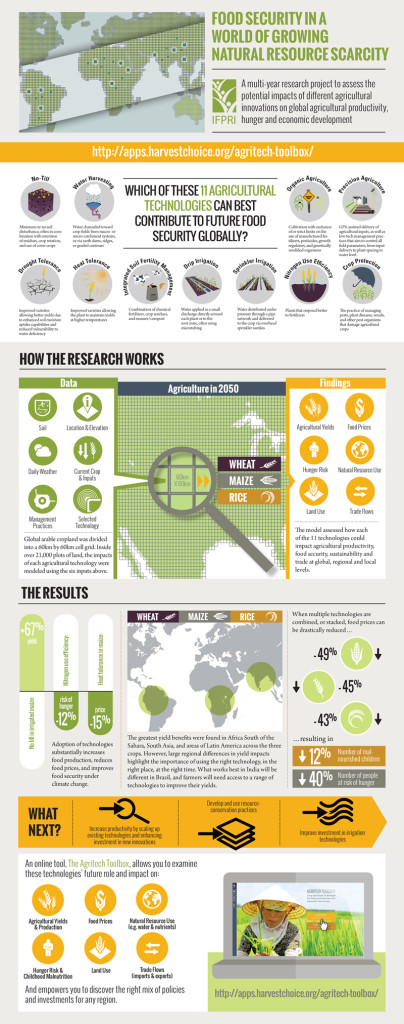
Infographic: Highlights of the study “Food Security in a World of Growing Natural Resource Scarcity (February 2014)”
International Food Policy Research Institute (IFPRI) published a new report today that measures the impacts of agricultural innovation on farm productivity, prices, hunger, and trade flows as we approach 2050 and identifies practices which could significantly benefit developing nations.
The book, “Food Security in a World of Natural Resource Scarcity: The Role of Agricultural Technologies“, examines 11 agricultural practices and technologies and how they could help farmers around the world improve the sustainability of growing three of the world’s main staple crops – maize, rice, and wheat.
Using DSSAT Cropping Systems Model and IMPACT International Food Trade Model, the study pinpoints the agricultural technologies and practices that can most significantly reduce food prices and food insecurity in developing nations. For each of half-degree (30 arc-minute; about 60 km resolution) grid cells across global crop land area, authors simulated the growth and yield of three crops (wheat, maize, and rice) for 40-year period sequentially under two climate change scenarios, with and without 11 agricultural innovations: crop protection, drip irrigation, drought tolerance, heat tolerance, integrated soil fertility management, no-till farming, nutrient use efficiency, organic agriculture, precision agriculture, sprinkler irrigation, and water harvesting. These crop model-estimated yield impacts were used in the IMPACT model to assess the technologies’ potential impact on global/regional/country-level trade, economy, nutrition, and food security.
Findings from the book indicate:
- No-till farming alone could increase maize yields by 20 percent, but also irrigating the same no-till fields could increase maize yields by 67 percent in 2050.
- Nitrogen-use efficiency could increase rice crop yields by 22 percent, but irrigation increased the yields by another 21 percent.
- Heat-tolerant varieties of wheat could increase crop yields from a 17 percent increase to a 23 percent increase with irrigation.
The study also highlights three key areas for investments prioritizing effective technology use:
- Increasing crop productivity through enhanced investment in agricultural research
- Developing and using resource-conserving agricultural management practices such as no-till farming, integrated soil fertility management, improved crop protection, and precision agriculture
- Increasing investment in irrigation
